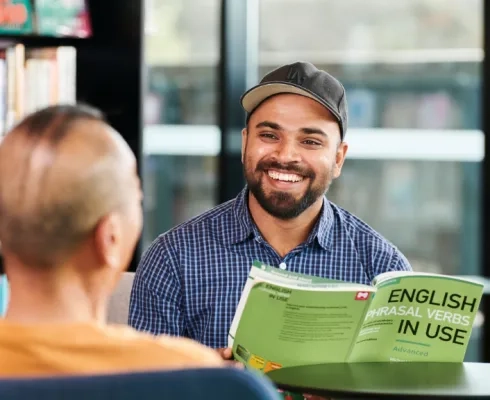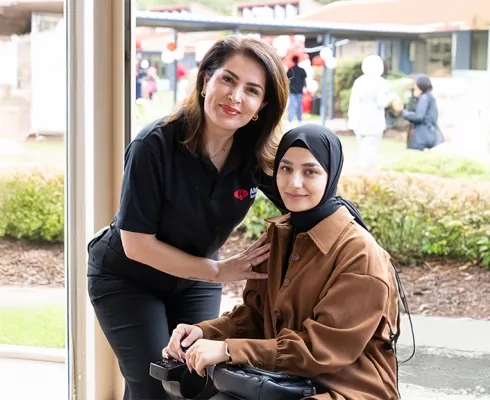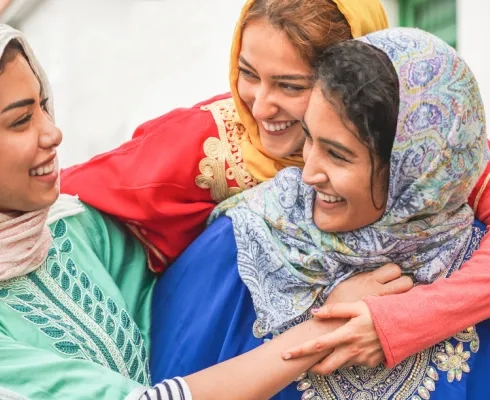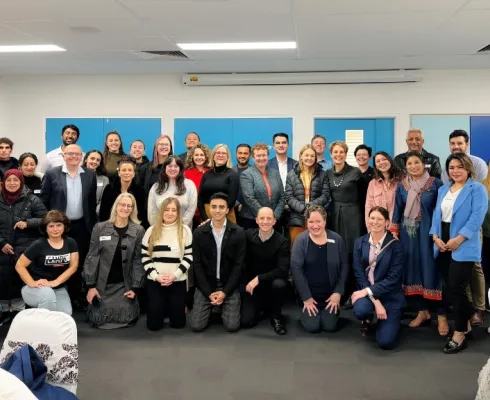Army blankets, lumpy beds and scalding hot tea on a 40 degree day. These were the first experiences of German migrant Gisela Lehre on her arrival at Bonegilla reception centre in January 1955.
Gisela had survived the allied bombing of her home in Bremen, been rescued in the nick of time from the barbarous Russian Army and worked like a drudge on a farm just so she could eat.
Now, she was in a strange land with a young child, very little English but hopes of a bright future.
She and her husband Manfred had escaped the post-war austerity in Europe and sailed to the other side of the world to try to secure a new life for themselves and their children.
“Bonegilla was a bit of a shock for us,” Gisela said.
“We arrived in Melbourne at Station Pier and were put on a train to Seymour. We had lunch – white bread sandwiches, which we hadn’t eaten before. On to Bandiana and then we were bussed to Bonegilla,” she said.
“We arrived at about 10 at night. It was very hot and following an evening meal – we were all hungry - we went into a big hall to be allocated our accommodation.
“It was not the most comfortable of places. We had army blankets and lumpy camp beds but the food was OK - although there was a lot of mutton which I had never eaten before - there are not many sheep in Germany.
“Mostly I remember that all there was to drink was hot black tea – even on really hot days,” Gisela said.
Two weeks later Manfred, who had worked as a plasterer and bricklayer at home, got a job in the refurbishment of the Menzies Hotel on Collins Street so returned to Melbourne leaving Gisela and Heidi at Bonegilla.
Over the next five weeks Heidi became seriously ill and was hospitalised for three weeks.
“I think it was the heat and the different food. And was bitten terribly by mosquitoes and had to go to hospital for treatment,” Gisela said.
Manfred returned to Bonegilla, the couple discharged their daughter from hospital and moved to Melbourne.
They rented some rooms in a house in North Sunshine owned by a Latvian man who became known to them as ‘Uncle George’. Gisela kept house in return for rent and when her brother-in-law also moved into the house with a friend, she was cooking and washing for four men and a child.
With no paved roads in the suburb at the time, Gisela would wear gumboots to walk to the shops.
The couple eventually built their own house in the next street, taking four years to complete it as buying second-hand bricks with any spare money they had.
“Each week we would have ten pounds left over so we would buy a truck-load of bricks and build a little more of the house,” Gisela said.
Hard work has been a constant theme in her life.
During the week - along with cooking, cleaning and washing - Gisela would clean the bricks so they could be laid by Manfred. They raised four children Heidi, Kari, Ronald and Gary in the house and lived there for 24 years.
Gisela also worked in factories in Sunshine and in a local bakery
In 1962 Gisela’s father Heinrich Willner visited intending to stay a year. But the death of Gisela’s brother in Germany meant he ended up staying five.
“My father rendered our house and then he bought a bicycle and went out and got a job as a toolmaker at Holden at Fisherman’s Bend,” she said.
From 65 until he was 70, Heinrich rode the 16 kilometres to and from work every day until he decided it was time to go home to Germany.
In the late 1960s land was opened up in Tawanga South and Gisela and Manfred bought a block. They built a garage which they lived in on rustic holidays.
They started building a house in Mt Beauty travelling seven hours up and down the Hume Highway on weekends and finally finishing it in 1973.
In 1980, with their children grown up, Gisela and Manfred moved permanently to the Alpine town. For Manfred, years of heavy work plastering took its toll and he became ill with a chronic neck condition.
On his recovery he got a job as the head gardener in Mt Beauty with the local council and received official citations for his tireless work beautifying the town.
Gisela worked at a chicken farm sorting and cleaning eggs for nine years from 1980.
In 1985 the couple built yet another home in Tawonga South, where Gisela lives today, with views of the Great Dividing Range.
“We planned this house standing on a step-ladder looking at the view,” Gisela said.
“I was from the mountains in Germany and my husband built this house to make me happy,” she said.
Manfred passed away in 2001 and Gisela still lives in the house near her daughter Karin, who moved to the area three years ago.
Although there are mountains nearby, life in Tawonga South is a long way from Gisela’s childhood in war-time Germany.
“The war wasn’t as difficult for me as for others. I was originally from Silesia. My dad was a toolmaker and went to Bremen to work building planes for the Focke-Wulf aircraft company,” she said.
“The company built houses for its workers so we all moved to Bremen.”
But with bombing raids on the increase Gisela was evacuated to the Salzberg region of Austria with her schoolmates to escape the destruction.
After two years she returned home to Bremen but the bombing continued so she was sent to live with her grandparents back in Silesia.
Silesia was in eastern Germany – part of what is now Poland – and in 1945 it was directly in the path of Russia’s marauding Red Army which infamously destroyed villages, stole food stocks and raped German women.
“My father came and got me out before the Russians came. Things were chaotic and the trains did not always run but he kept an eye on which lines were running and when he saw the opportunity he came for me and got me out on my fourteenth birthday,” Gisela said.
Upon her return to Bremen, Gisela was sent to work on a farm to protect her from the bombing and also so she would have access to food as the German state collapsed under the weight of invasions by the allies in the West and the Russians in the East.
“It was very hard work on the farm – milking cows, cleaning out the pigsties, putting in crops and doing all sorts of farm work,” Gisela said.
“It was heavy work, we had no machines and just two horses to work the land,” she said.
At the end of the war Gisela did whatever she could to make ends meet. She learned to be a housekeeper and cooked, washed and looked after children for wealthier families.
She also worked in a bakery which was where she met Manfred; and also factories, including in a plant making chocolate.
Gisela was married at 20 and 18 months later he first child Heidi was born.
She says the decision to come to Australia was a surprise.
“One night my husband came home with some papers and he didn’t come to bed as usual,” Gisela said.
“When I asked him what he was up to he just said ‘have a look at this and sign it’.
“At the time I didn’t have clue what they were but these were application papers to come to Australia.
“I had to get map out to see where Australia was. I said I would go but only if we went to somewhere with roughly the same latitude as where we were.
“I didn’t want to be too hot or too cold, so that’s how we ended up choosing Melbourne,” she said.
Gisela says she has never regretted the move.
“I think because of my childhood, I can adapt anywhere. I never thought of going back and the part of Pomerania my husband came from had become part of Poland,” she said.
In 1996 daughter Karin took Gisela on a journey revisiting the first twenty years of her life.
“Mum and I went to Germany, Austria and Poland visiting all of the places she had been as a young woman. Then in 2011 on Mum’s 80th birthday, together with Heidi, we even went to Fremantle, the first place they set foot in Australia,” Karin said.
Karin also arranged for Gisela and Manfred’s names to be inscribed on one of the bricks at Melbourne’s Immigration Museum that is a celebration and a sort of matrix measure of the contributions migrant families have made to this country.
But for Gisela’s there’s a simpler measurement.
“Australia has been good for us. We built three homes and our children have all done well. It’s enough,” she says.




